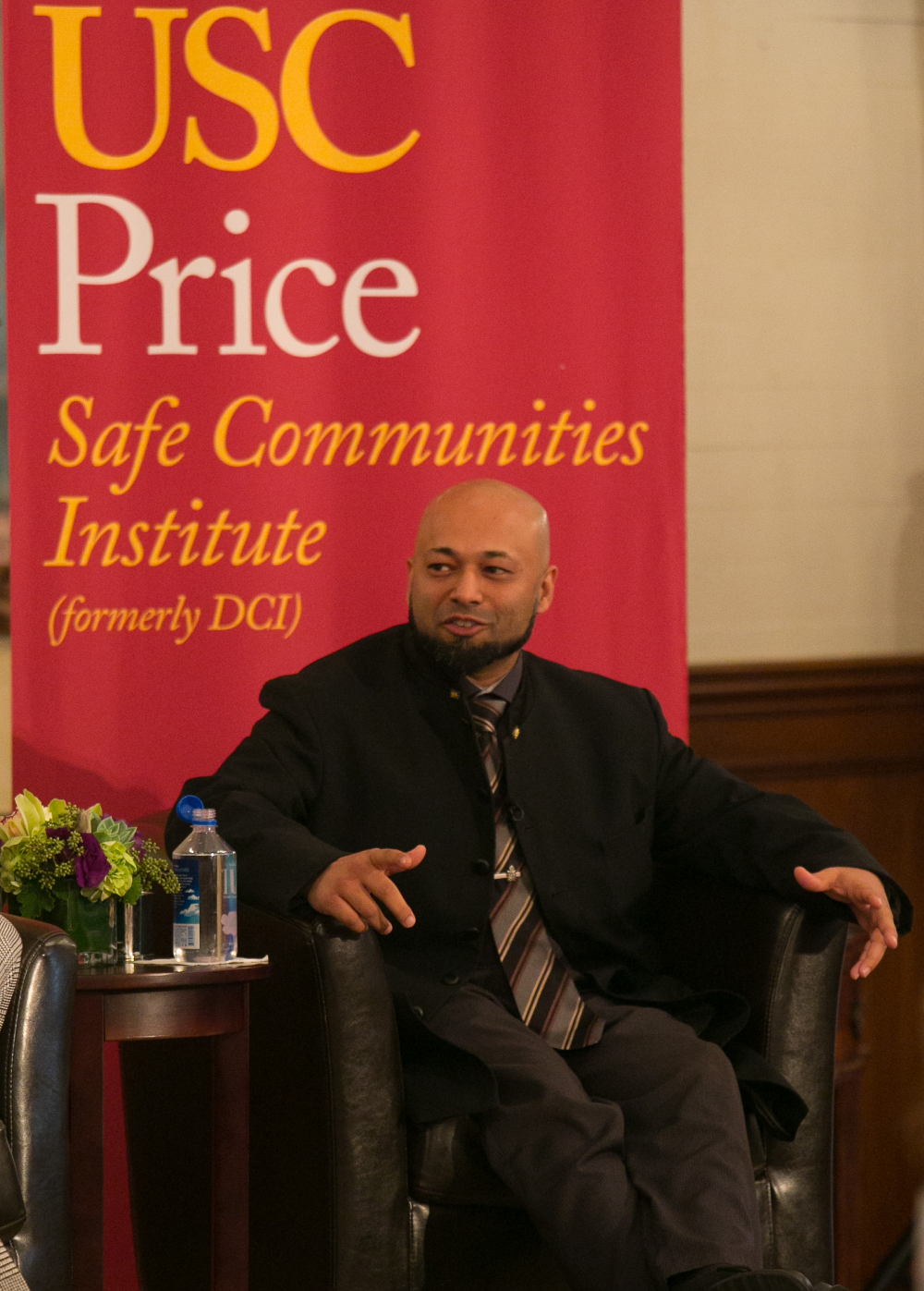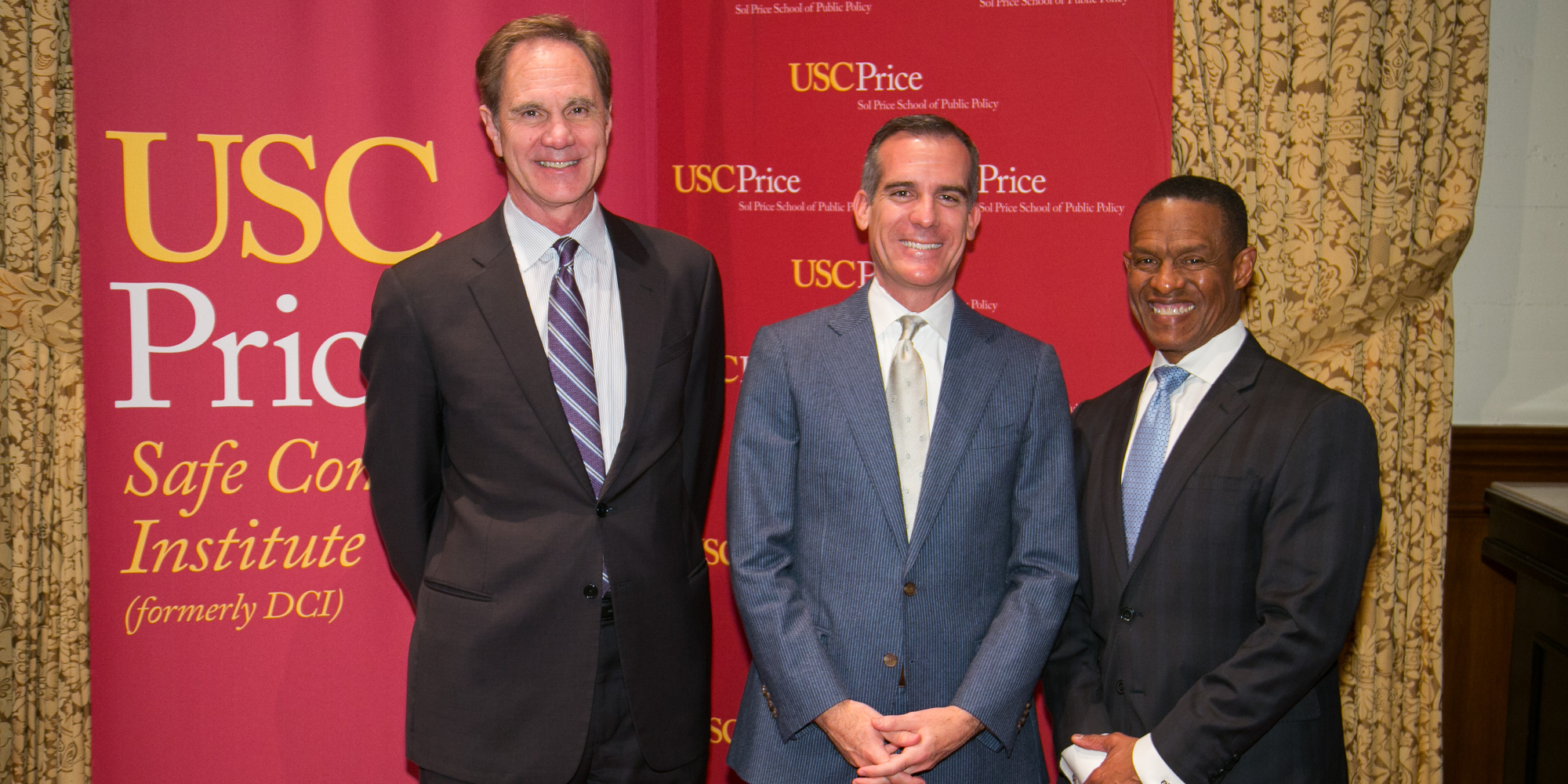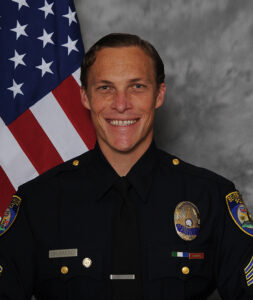Article by Anthea Xiao, Daily Trojan
On Tuesday, the Price School of Public Policy’s Safe Communities Institute hosted a summit titled “Global Solutions in the Age of Homegrown Violent Extremism,” which featured experts in counter-terrorism, policymakers, law enforcement officials and former extremists to discuss potential solutions to domestic terrorism.
The summit seeks to address homegrown violent acts committed by extremists who are inspired by a diverse collection of ideological motivations, based on race, religion and other issues.
The discussions explored better detections and deterrents for radicalization and extremism recruitment. The summit featured speakers like former Islamic extremist Mubin Shaikh and USC Price Homegrown Violent Extremism Studies Program Director Erroll Southers, who spoke to the Daily Trojan on the importance of the summit and homegrown violent extremism. He offered his outlooks on mitigating homegrown violent extremists within the L.A. community.
Southers thinks there is a need for the public to acknowledge both white supremacists and foreign jihadists as extremists.
“RAM — Rise Above Movement is a white supremacist extremist movement that is located here in Southern California,” Southers said. “They are out there and they are literally homegrown.”
Southers noted that many students and even Los Angeles law enforcement officers were unaware of these agitations, which he classified as extremism.
The summit was held to mitigate the lack of awareness in the L.A. community beyond educating students, he said.
Southers identified the Trump administration as the main trigger of today’s upsurge in homegrown violence.
“We did not have this happen a year ago; we did not have this two years ago,” Southers said. “People are emboldened now. The rise of hate crime has gone up since January. There is no coincidence here. There is a certain dynamic that is going on … [extremists] across the country feel they can now come out.”
Southers emphasized the importance of acknowledging the problem and having leadership that expresses unity. As a professor at USC, Southers believes increased campus awareness can build a discourse around homegrown violent extremism.
“[With my students], I challenge them to investigate what happened in homegrown terrorism or international terrorism,” Southers said. “We never had a class where we could not find anything … so it really is just a matter of reading and being more educated on the subject.”

Shaikh, who is now an expert on counterterrorism and a former Canadian intelligence member, spoke as a panelist about the dangers of radicalization and terrorist recruitment. In an interview with the Daily Trojan, Shaikh said there is never only one sign of indoctrination in a homegrown terrorist; rather, there are a cluster of behaviors the public should learn to recognize.
“The closer to dehumanization, the more extreme the groups are,” Shaikh said. “For example, [there is] very rigid black and white thinking: seeing the world in absolutes.”
As a Muslim born and raised in Canada, Shaikh grew up within two conflicting and competing cultures. During his two-year stay in Syria, Shaikh fully embraced jihadist culture and was inspired by hate crimes. Following the 9/11 terrorist attacks, Shaikh evolved into a champion of deradicalization and began to recognize signs of indoctrination.
“Signs could include negative peer influences, conflicts with family over identity crisis and religion and isolation,” Shaikh said.
He suggested that students be aware and identify potentially vulnerable people, especially younger individuals, who are at risk of potentially being indoctrinated.
Shaikh also gave advice to Muslim students reconciling their identity and faith.
“You need to be out there,” Shaikh said to the Muslim community. “Getting involved with interfaith activities is very important — as people of faith to reach out [to] other people of faith.”
According to Shaikh, it is impossible to predict violence, but by increasing the local community’s awareness of extremism, he believes violence can be preventable.
To combat extremism, Shaikh advocated for acceptance and love, instead of retaliating with further hate crimes.
“[It] is all about strength in numbers,” Shaikh said. “[Extremists] just need to see that they are outnumbered by regular decent people … It is time for us to show force.”
Persistence and strength in numbers changed Shaikh’s life, and he likewise hopes they will alter extremist thinking.
“At the time I remember people trying to tell me things, and they did not really activate in my life until much later,” Shaikh said. “So don’t give up on people.”
Southers also echoed similar sentiments, emphasizing the importance of protecting marginalized student groups, especially the Muslim population, from being associated with extremism.
“I think we have to live the USC creed of inclusion, of tolerance, of respect and dignity,” Southers said. “If we live out those values, we will protect each other.”
Yet, Southers offered a positive outlook on the future of decreasing the rates of homegrown violence.
“I have a really good outlook on this situation, because I believe the people who are here today are part of the solution,” Southers said. “This is not a government response; we need to fix this, and I think we can.”
This article was originally published in the Daily Trojan.
Watch recorded video of the summit’s panel discussions and keynote addresses.




